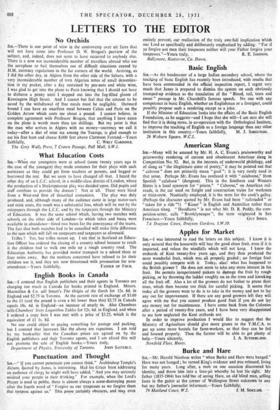What Education Costs
SIR.—When our youngsters were at school (some twenty years ago in the case of the youngest) they made costumes for their plays with such assistance as they could get from teachers or parents, and begged or borrowed the rest. But we seem to have changed all that. I heard the other day of an L.C.C. school, in a middle-class district of London, where the production of a Shakespearean play was decided upon. Did pupils and staff combine to provide the dresses ? Not at all. These were hired from a West-end firm of theatrical costumiers. The play was duly produced, and, although many of the audience came in large motor-cars and mink coats, the result was a substantial loss, which will be met by the ratepapers through the L.C.C. and by the taxpayers through the Ministry of Education. It was the same school ivhich, having two matches with schools on the other side of London—to which tubes and buses were available in abundance—hired two buses for the conveyance of the teams. The fact that both matches had to be cancelled will make little difference to the sum which will fall on ratepayers and taxpayers as aforesaid.
Trifles ? Yes,'but trifles mount up. I see that in Scotland an Educa- tion Officer has ordered the closing of a country school because to reach it the children had to walk one mile up a' rough country road. The Education Authority has provided motor transport to a school three or four miles away. But the mothers concerned have refused to let their children use it, and they are now threatened with prosecution for non-






























 Previous page
Previous page